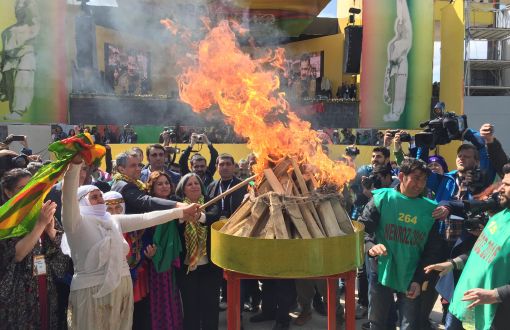Click to read the article in Turkish / Kurdish
The Peoples’ Democratic Party (HDP) and Democratic Regions Party (DBP) have announced that they would hold the Newroz celebrations with the slogan “We Will Definitely Win”.
The celebrations, which will be organized over 30 centers, will be combined with “No” campaign due to the fact that it falls ahead of the constitutional amendment referendum to be held on April 16.
The celebrations that will take start in Turkey’s southeastern Mardin’s Nusaybin district on March 17 will end with the events that will take place in Van on March 21.
The Newoz celebrations will be held in the following dates and places:
March 17 Friday: Nusaybin
March 18 Saturday: İzmir, Bursa, Adana, Dersim, Antep, Malatya, Doğubayazıt, Manisa, Kocaeli, Siirt.
March 19 Sunday: İstanbul, Mersin, Antalya, Urfa, Yüksekova, Batman, Konya, Karakoçan, Kars, Hatay, Kızıltepe.
March 20 Monday: Muş, Cizre, Adıyaman, Iğdır, Bitlis, Hakkari, Ağrı, Bingöl.
March 21 Tuesday: Diyarbakır and Van.
Newroz
Newroz or Nawroz (Kurdish: نهورۆز/Newroz/Nawroz, also: Gulus[2] Kurdish: گوڵوس) refers to the celebration of the traditional Iranic peoples new year holiday of Nowruz in Kurdish society.
Before the Islamization of the Iranic peoples in Asia, the Zoroastrian religion was believed in by the ancestors of the modern Kurds. In Zoroastrian doctrine, fire is a symbol of sight, goodness and purification.
Angra Mainyu, the demonic anti-thesis of Zoroastrianism, was defied by Zoroastrians through creating a big fire every year, to symbolize their defiance and hatred for evil and the arch-demon. Nevroz is mainly, in the modern age, affiliated with Kurds, who are in turn make the majority of the Alevi population, which is an Islamized version of the Zoroastrian religion, due to 1400 years of persecution by Arab Muslim rule.
Also, in Kurdish legend, the holiday celebrates the deliverance of the Kurds from a tyrant (remember the relevance of Angra Mainyu), and it is seen as another way of demonstrating support for the Kurdish cause, essentially what's left of their Aryan/ Iranic roots. (Source:Wikipedia) (TP/ÇT/TK)




